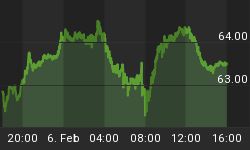I have spoken many times about "income skew" during the recovery. However, I was never able to precisely quantify the "skew". It's now possible, thanks to many readers who sent a link to a Huffington Post article on Income Gains During the Recovery.
The original source of the data is a study Striking it Richer: The Evolution of Top Incomes in the United States by Emmanuel Saez.
From 2009 to 2011, average real income per family grew modestly by 1.7% but the gains were very uneven. Top 1% incomes grew by 11.2% while bottom 99% incomes shrunk by 0.4%. Hence, the top 1% captured 121% of the income gains in the first two years of the recovery.
From 2009 to 2010, top 1% grew fast and then stagnated from 2010 to 2011. Bottom 99% stagnated both from 2009 to 2010 and from 2010 to 2011. In 2012, top 1% income will likely surge, due to booming stock-prices, as well as re-timing of income to avoid the higher 2013 top tax rates. Bottom 99% will likely grow much more modestly than top 1% incomes from 2011 to 2012.

This suggests that the Great Recession has only depressed top income shares temporarily and will not undo any of the dramatic increase in top income shares that has taken place since the 1970s. Indeed, excluding realized capital gains, the top decile income share in 2011 is equal to 46.5%, the highest ever since 1917 when the series start.
How and Why?
Inquiring minds may be wondering how and why this happened and what to do about it. Currently there is a lot of misguided thinking such as calling for caps on CEO pay and increased minimum wages as proposed by president Obama in his state of the union address.
I propose that to find a cure, one needs to understand the problem and what causes it. In that regard, it's crucial to understand that inflation benefits accrue to those with first access to cheap money, the banks and the already wealthy.
Consider the housing boom and bust. By the time easy credit was universally available (with sensible income and down payment requirements flying out the window), the party was nearly over.
The root cause of boom-bust cycles (and the associated income inequality distortions) is the Fed's inflationary and reflationary policies. Simply put, the Fed has sponsored bubbles and busts of increasing amplitude over time, and those with first access to cheap money have come out ahead at the expense of everyone else.
It's even worse than that. The Fed's policy of "too big to fail" encourages rampant speculation if not outright manipulation in both directions.
How, Why, Solutions
The solution to income disparity is not wage caps on executive pay or hikes in the minimum wage, but rather the elimination of the Fed, the elimination of fractional reserve lending, and a return to sound money policies that do not benefit the already wealthy at the expense of everyone else.
For a detailed rebuttal to Obama's alternative proposals including a hike minimum wages, please see Hot Air and No Substance; Obama's Plan to Destroy Jobs "Won't Cost a Dime"















